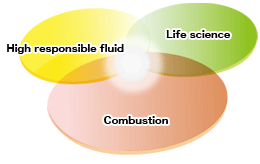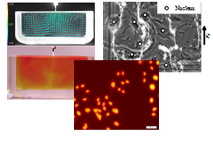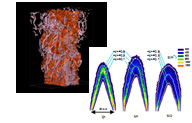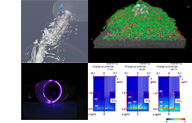Collaborative research project: Transdisciplinary project
Greetings
Transdisciplinary collaborative research projects leader
Professor Jun Ishimoto

In 2010 the Institute of Fluid Science was recognized by the Japanese Ministry of Education as a National Joint Usage/Research Center,and a new interdisciplinary collaborative research project to promote "Frontier Science of Next Generation Reactive Fluid" was established. In contrast to conventional collaborative research projects in which advanced research is conducted by researchers from as single field,the present project is a transdisciplinary effort involving a group of researchers from different fields. Specifically,experts in life science,combustion science,and high responsible fluid science are working together to study various reactive flows in biology, chemistry,and high responsible fluids . We believe that the integrated research results generated by this transdisciplinary mode of research will lead to a new stage of development in the academic field and open up a new frontier in the science of next generation reactive fluid.
In the period since the Great East Japan Earthquake and Tsunami,a great deal of attention has been focused on the role of university research institutions in the recovery efforts. University-based research institutions are called upon to take a broader and more comprehensive view of world trends than is possible for research facilities within industrial structures,and we have a responsibility to conduct research that will contribute to the development of a society based on sustainable energy. This project is a part of this effort.
It is widely expected that in the near future reactive fluid mechanics will become a major field of study in next-generation fluid science; however,many physicochemical processes,and many elementary processes related to thermophysical flows are still poorly understood,and the studies carried out so far at the engineering level cannot be considered adequate.
Given this background,in order to establish "Frontier Science of Next Generation Reactive Fluid" on a solid footing,it is imperative that we move beyond the conventional approach of conducting advanced studies within a single field and adopt innovative interdisciplinary modalities that transcend traditional barriers of specialization. The present interdisciplinary project is designed to do precisely this,using the latest findings from fluid science as a foundation,and adding insights from biology,chemistry and the study of high responsible flows . We anticipate that this approach will contribute to the establishment of a next-generation approach to the study of reactive fluid dynamics.
Transdisciplinary collaborative research projects
Multiple researchers from our center,together with a number of researchers from outside institutions are jointly using our facilities and equipment to conduct a transdisciplinary collaborative project based on our major research theme (Frontier Science of Next Generation Reactive Fluid).

Research theme: Frontier Science of Next Generation Reactive Fluid
Research overview: The object of this project is to carry out transdisciplinary research in the fields of life science,combustion science,and highly reactive fluid science in order to establish a new field of study,a transdisciplinary Frontier Science of Next Generation Reactive Fluid,to study reactive flows in biology,chemistry,and high responsible fluids.
1) Life science group
Research on reaction and transport phenomena with cell/living tissueThe objective of this group is to clarify reaction and transport phenomena at multiple scales within cells and living organisms,and to elucidate basic principles governing the interaction between cells and flow fields.

2) Combustion group
Research on combustion and chemical kineticsCombustion/reaction phenomena are being used in an increasingly diverse and sophisticated range of technologies. This group focuses on research to clarify,model and control combustion/reaction phenomena. This is expected to contribute to the creation of a sustainable society through development of next-generation reactive fluid technologies with low environmental impact.

3) High responsible fluid group
Development of the different academic field integration of high responsible fluidThis group is pioneering an transdisciplinary approach to the study of fluids and thermal flows that exhibit specific reactions,responses or functions upon exposure to external factors. The objective is to discover new types of nano-functionality,study the physics of reactive surfaces,promote development of sustainable energy and a low carbon society,further the study of recycling science,and improve our understanding of coupling in fluid-solid materials. This is expected to lead to a wide range of innovative applications to promote human welfare.
